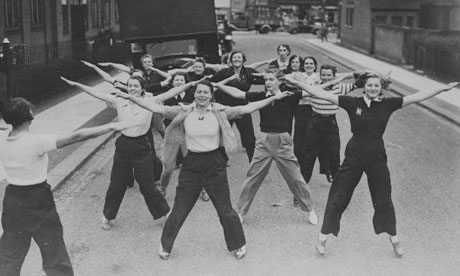As Anita Leslie's memoir, Train to Nowhere, illustrates, the second world war was an opportunity for some to embark on a six-year-long adventure

Volunteer female ambulance drivers take part in an aerobics class in a London street, 1939. Photograph: Hulton-Deutsch Collection/Corbis
There are some books that will probably never be written. Here's one. It might be called "Oh What (Another) Lovely War!" Its subject? The second world war. This global crisis saw not only the enslavement of millions but also, worst of all, the slaughter of more than 60 million men, women and children, often in circumstances of unique and unspeakable horror.
I'm not denying that for a moment. Nor are the historians – experts such as Antony Beevor (Stalingrad), Max Hastings (Armageddon) and Ian Kershaw (The End). Together with many others, these popular scholars have exposed the full horror of the Third Reich, the massacres, the torture and the rapes perpetrated on a continent that has been the cradle of western civilisation. Millions worldwide have read these books, from which they derive the global view of the last world war.
But here's the thing. If you were fortunate enough not to get blitzed, tortured or raped in the war, what did you do? You had the time of your life, that's what. I don't say this in any light or flippant spirit, but on the basis of historical record, or at least memoir. The point about the historiography of the second world war is that it comes in two, contrasting instalments.
First, there's the heart of darkness, such as the Russian front, where Hitler and Stalin's troops fought what the Germans called rattenkrieg, "the war of the rats", from ruined house to bombed-out basement. Elsewhere, in Normandy, Dachau, Guadalcanal and Monte Cassino, we have, like Macbeth, supped full of horrors, with masterchefs Kershaw, Hastings et al.
But before that, in the 1940s and 50s, there was another generation of books. In quite a different spirit, titles such as Ill Met by Moonlight and Appointment With Venus celebrated the – shall we say? – more sporting side of the conflict.
Before everyone writes in to complain about the tasteless tone of these remarks, let me direct the gentle reader towards a remarkable second world war memoir I was recently sent by a friend. Train to Nowhere, published by the then independent Hutchinson in 1948, was praised in the Observer for its "calm, youthful candour, its forthright acceptance of the whole duty of war service".
Its author, whom I'd never heard of, was Anita Leslie, a young Irish woman who turns out to have been distantly related to Winston Churchill. Miss Leslie was an ambulance driver on no fewer than four battle fronts (the Western Desert, Italy, France and Germany).
Robert McCrum's full story at The Observer.
I'm not denying that for a moment. Nor are the historians – experts such as Antony Beevor (Stalingrad), Max Hastings (Armageddon) and Ian Kershaw (The End). Together with many others, these popular scholars have exposed the full horror of the Third Reich, the massacres, the torture and the rapes perpetrated on a continent that has been the cradle of western civilisation. Millions worldwide have read these books, from which they derive the global view of the last world war.
But here's the thing. If you were fortunate enough not to get blitzed, tortured or raped in the war, what did you do? You had the time of your life, that's what. I don't say this in any light or flippant spirit, but on the basis of historical record, or at least memoir. The point about the historiography of the second world war is that it comes in two, contrasting instalments.
First, there's the heart of darkness, such as the Russian front, where Hitler and Stalin's troops fought what the Germans called rattenkrieg, "the war of the rats", from ruined house to bombed-out basement. Elsewhere, in Normandy, Dachau, Guadalcanal and Monte Cassino, we have, like Macbeth, supped full of horrors, with masterchefs Kershaw, Hastings et al.
But before that, in the 1940s and 50s, there was another generation of books. In quite a different spirit, titles such as Ill Met by Moonlight and Appointment With Venus celebrated the – shall we say? – more sporting side of the conflict.
Before everyone writes in to complain about the tasteless tone of these remarks, let me direct the gentle reader towards a remarkable second world war memoir I was recently sent by a friend. Train to Nowhere, published by the then independent Hutchinson in 1948, was praised in the Observer for its "calm, youthful candour, its forthright acceptance of the whole duty of war service".
Its author, whom I'd never heard of, was Anita Leslie, a young Irish woman who turns out to have been distantly related to Winston Churchill. Miss Leslie was an ambulance driver on no fewer than four battle fronts (the Western Desert, Italy, France and Germany).
Robert McCrum's full story at The Observer.
No comments:
Post a Comment